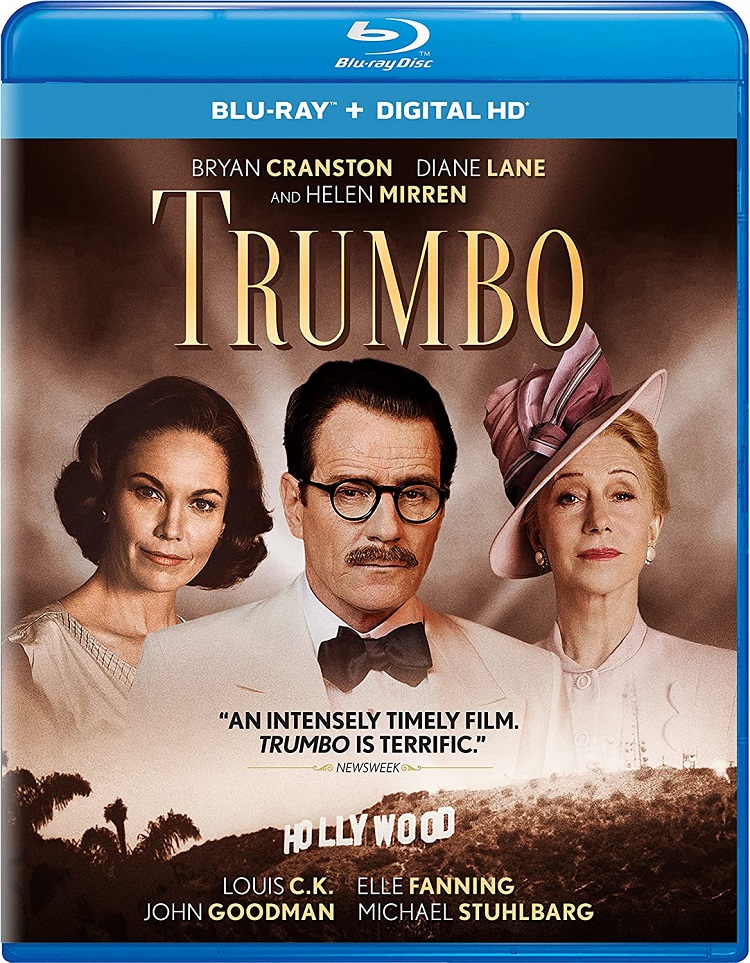
The only thing Hollywood likes more than making movies portraying themselves as heroes is making movies portraying themselves as martyrs fighting against oppressive forces. I’ve lost count at how many movies have been made about the Hollywood Blacklist. If all you knew of history was what came from Hollywood, you’d think Joseph McCarthy was worse than Stalin and Hitler combined. You’d never know that the House Un-American Activities Committee ruined the lives of thousands of people from all stripes of life across the country rather than just the artists in and around Hollywood.
Trumbo is yet another Hollywood movie portraying yet another Hollywood insider standing righteously for freedom against the evils of HUAC and the U.S. government. Never mind that it plays fast and loose with the facts or that it skims over the real Dalton Trumbo’s skeletons in his closet.
But you know what? This isn’t that kind of review. I’m not really interested if Trumbo is historically accurate or if it whitewashes some of the darker details of its characters lives. All I want to talk about is whether it is a good story and that told well.
The answers are: not really and mostly.
We’ll talk about what works first. Who knew poor, goofy Hal from Malcolm in the Middle would become one of our greatest actors? Well, everybody who was actually paying attention to his performance in that show, for which he was nominated for multiple awards. He won a bunch for Breaking Bad, garnered a Tony for playing Lyndon B. Johnson in All The Way, and now has an Oscar nomination for this film.
He treats the role like a juicy steak and chews his way through every scene. Slurps down some cheese and corn, too. But man does he make it work. I’ve never seen the real Dalton Trumbo speak or react, but I believe Bryan Cranston in that role. He transforms himself completely and becomes – if not the actual man – then a full formed, and richly developed. He’s simply electric in every moment.
The rest of the main cast shines bright as well, especially Hellen Mirren as Hedda Hopper, the trashy gossip columnist, and Louis CK as Arlen Hird, a composite of several real life blacklisted people. Diane Lane and Elle Fanning as Trumbo’s wife and daughter respectively do their best with weakly drawn characters.
Others playing well-known actors and personalities don’t fair nearly as well. David James Elliott as John Wayne and Dean O’Gorman as Kirk Douglas are so unlike their real-life personalities as to be distracting. Admittedly, it’s difficult to portray people who are so embedded in the consciousness of our culture, but they could have at least made them look and sound something in the vicinity of those people. If you saw Elliott at a party from far away and you had something in your eye, you might mistake him for John Wayne, but on screen I just kept wondering what had happened to The Duke.
It’s a real shame that a film about one of the greatest screenwriters of all time is so completely safe in its storytelling and so riddled with cliches. Trumbo never goes anywhere unexpected. Though based on true events, you’ve seen this story play out hundreds of times.
Wait, you mean I’m half a dozen or so paragraphs into this review and I’ve not even mentioned the plot? To sum up: Dalton Trumbo was one of the most successful screenwriters in the 1940s and an avowed communist, but not one of those evil Stalinist-Russian commies who commit mass murder. Rather, he just wants to help the working class, and rally the labor unions, all the while getting richer and richer himself. Then HUAC comes calling, and Trumbo stands up for himself (and Freedom, dammit), gets thrown in jail, and blacklisted. He then secretly writes terrible movies for a b-movie producer, but slips in a couple of good ones under false names (and wins Oscars for them – Roman Holiday and The Brave One.) Heroically, Kirk Douglas and Otto Preminger let Trumbo put his name on their movies (Spartacus and Exodus). Trumbo triumphs, the HUAC fails, and all is good in the world.
Or something. The real story is fascinating, and the film keeps it mostly interesting, even if it skips on many of the details, and fudges a few more. It’s just that it could have been so much better. But instead in relies on tired Hollywood formulas and never rises above.
Jay Roach, better known for comedies like the Austin Powers series and Meet the Parents, does a competent job directing and manages some very beautiful shots, but at 124 minutes, he lets it run way too long.
Trumbo comes with a beautiful, high-definition transfer. Details are nearly spotless, colors are bright and really pop, and the blacks are rich. It’s a talking movie and as such there isn’t much to the audio but the vocals are crisp and clear and the background noises are smooth and nuanced. Extras are minimal with only a four-minute featurette on the real Trumbo and a two-minute one on Cranston becoming the character.
Ultimately Trumbo is enjoyable enough. A weak script is heightened by some excellent acting and pitting Bryan Cranston against Hellen Mirren is something we should hope to see in many movies to come. If only we could be so lucky.